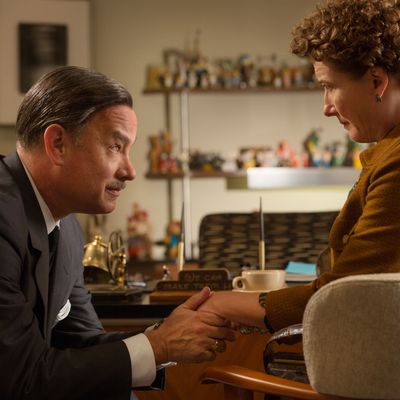
Walt Disney himself is the hero of the new Disney comic weeper Saving Mr. Banks, in which the Big Man (Tom Hanks) uses every means at his disposal — charm, wiles, money — to convince the author of Mary Poppins, P.L. Travers (Emma Thompson), to sell him the rights to her character. High-minded but badly in need of cash, the solitary Travers flies from brittle London to balmy L.A., where she withholds her signature from the contract, primly announcing that “Mary doesn’t sing” and that animation is out of the question. Meanwhile, her tiffs with the screenwriter and composers trigger flashbacks of her days as an auburn-tressed darling child (Annie Rose Buckley) with a zany, warm, but deeply unstable dad (Colin Farrell). Before P.L. can entrust her precious Mary to strangers, she must come to terms with the trauma that brought that governess who arrives via umbrella into being. Can Walt find the key to unlock Mrs. Travers’s mind and heart?
If anyone can, it’s the man who created the Magic Kingdom.
When did Emma Thompson become so uninteresting? She used to be quick-witted, with naughty eyes, a fanged grin, and a hint of mystery. But playing Nanny McPhee seems to have ossified her, and there isn’t a surprising note in her performance. She and Hanks get nothing going in their long, draggy scenes, in part, I suspect, because the portrait of Walt has been vetted to death by every member of the Disney family along with a battery of executives. No way, no how can even a jot of unwholesomeness mar the Great White Father of an international conglomerate.
Jason Schwartzman and B.J. Novak supply some zest as the Sherman brothers (their Mary Poppins songs hold up, especially “Feed the Birds” and “Chi-chim-cheree”), but Paul Giamatti should be embarrassed to have accepted (and not risen above) the role of Travers’s life-affirming, working-class L.A. chauffeur, who calls her “Missus” and, after revealing that he has a disabled child, declares with gentle stoicism, “You can’t worry about the future, only today.” Too bad Mary Poppins wasn’t around to whomp him with her umbrella.
A fair number of people have responded with tears and laughs to Saving Mr. Banks, but I found it interminable. Director John Lee Hancock (The Blind Side) doesn’t have the glancing touch that material this obvious needs; he hits every note dead-on. The bigger problem is that when we finally understand the meaning of that strange title, it’s impossible to make the essential connection between Farrell’s depressive alcoholic and David Tomlinson’s sexless martinet in Disney’s Mary Poppins. Thank God (and the Shermans) for “Let’s Go Fly a Kite.” It ended Mary Poppins on a high and gives a much-needed lift to the anvil that is Saving Mr. Banks.


